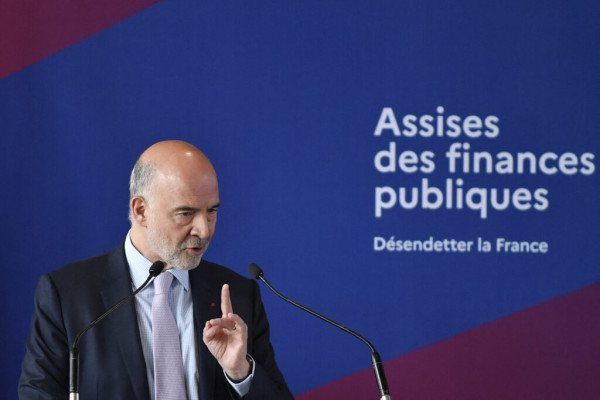French deficit warning taints Bruno Le Maire’s ministerial legacy
PARIS — There's no smooth sailing into the sunset for Bruno Le Maire as he approaches his final days in French President Emmanuel Macron's administration this week.
The outgoing finance minister, whose resigned along with the rest of the French government on Tuesday, has received a brutal assessment of his performance over the past seven years.
In a report out Monday, France's Court of Auditors slammed the government's economic track record, saying it had failed to deliver sufficient public spending cuts and made “unrealistic” debt-reduction promises for the future.
The bean-counting body, which sits independently of the government, argued that France's poor public finances had been a direct byproduct of the government's failure to cut public spending in 2023 and its decision to lower taxes instead.
Le Maire has cut public spending by over €20 billion this year and was planning to cut it further next year with a view to bringing France's deficit in line with European Union rules.
But at 5.5 percent of GDP for 2023, the difference between what the French government spends and what it pulls in through taxes is still way off the 3 percent figure demanded by Brussels.
France's failure to rein in its spending has since landed it in trouble with Brussels.
Last month, the European Commission announced it would launch a so-called excessive deficit procedure against France and six other countries for not complying with EU rules on public spending. The procedure will be officially launched on Tuesday at a meeting of finance ministers.
But Le Maire had a different view about his seven years in office (a record for the Fifth Republic). As he headed to Brussels for his last meeting with his eurozone counterparts, the minister pushed back strongly against the auditor's criticisms.
“That lowering taxes would contribute to worsening public finances, is an accounting vision [of the court of auditors] that doesn’t correspond to economic reality,” Le Maire told reporters over the phone on Monday.

Le Maire also warned against the risk of “weaponizing” the debate on France's spending for political goals.
The court's president, former EU economy commissioner and socialist heavyweight Pierre Moscovici, had no time for Le Maire's arguments. “We are the only ones who have made no effort to reduce the debt,” he noted in an interview with Les Echos.
A solemn farewell
The warnings over France's fiscal health come amid political uncertainty following a snap election that produced no clear winner, but which increased the presence of parties that ran campaigns promising higher public spending.
The left-wing New Popular Front alliance, which came in first, proposed generous social policies that would massively increase public spending. The left also pledged to withdraw Macron's controversial pension reform, which increased the retirement age from 62 to 64 for most workers.
A similar policy was proposed by Marine Le Pen's National Rally, even if the far-right party later backpedaled on some of its most expensive electoral promises.
Ratings agency Moody's warned last week that it could downgrade France should any new government backtrack on the pension reforms and others undertaken by Macron's administration to date. The warning followed a cut by the S&P ratings agency last month.
In line with official protocol, Le Maire, along with all of Macron's other ministers, will continue in office until a new government formally takes over. When that will be is still unclear.
During the interim, however, work on next year's budget will begin to make life easier for successors.
“We will prepare options for the next government, but it will be up to them to decide,” Le Maire said, stressing that “it is indispensable to redress public finances.”
It's in Brussels, not France, that Le Maire's stint as finance minister — encompassing 91 meetings of eurozone ministers since 2017 — is likely to be best remembered. As well as advocating for fiscal decisions to be determined by a majority rather than unanimous vote, the Frenchman has left a lasting footprint on a range of policies from relaxing EU anti-subsidy rules to boosting trade defenses against China and taxing multinationals worldwide.
“In seven years I think we've shaken things up and broke a number of taboos,” he told reporters ahead of his final Eurogroup meeting on Monday.